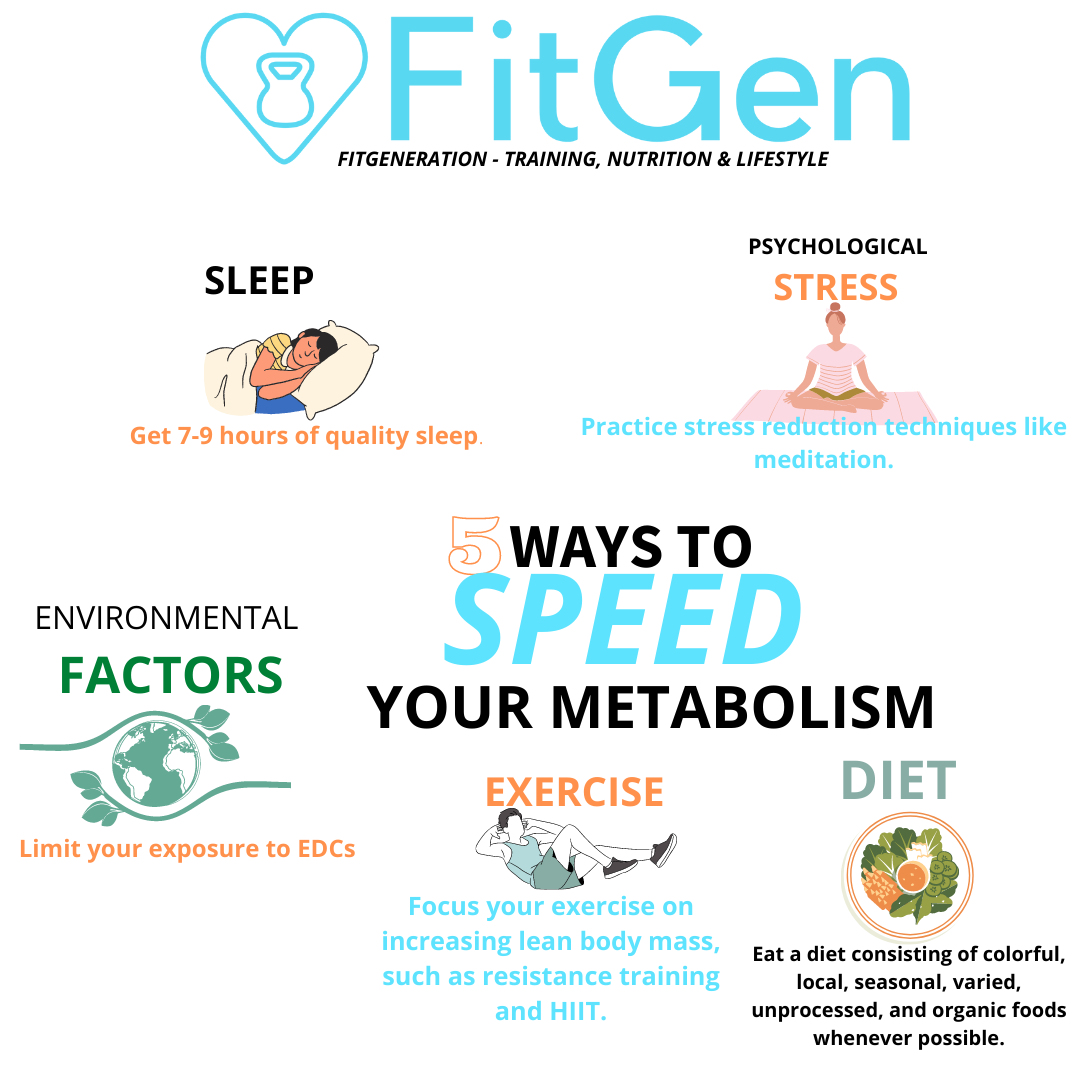There are several easy and effective ways to increase your metabolism, many of which involve making simple changes to your diet and lifestyle.
These 5 ways to speed up metabolism are best understood with the acronym SPEED:
S– Get 7-9 hours of quality sleep.
P– Practice stress reduction techniques like meditation.
E– Limit your exposure to EDCs.
E– Focus your exercise on increasing lean body mass, such as resistance training and HIIT.
D– Eat a diet consisting of colorful, local, seasonal, varied, unprocessed, and organic foods whenever possible.
Let’s jump into the science behind SPEEDing up your metabolism!

1 SLEEP
We are a sleep-deprived society with evidence showing that we sleep an average of 6.8 hours per night instead of the recommended 7-9 hours recommended for adults by the National Sleep Foundation.
Sleep is intricately connected to numerous hormonal and metabolic processes and is a key to maintaining metabolic homeostasis. Poor sleep hygiene has profound metabolic and cardiovascular implications and is believed to cause metabolic dysregulation through sympathetic overstimulation, hormonal imbalance, and low-grade inflammation.
Sleep deprivation can alter the glucose metabolism and hormones involved in regulating metabolism, such as decreased leptin levels and increased ghrelin levels. Chronic sleep deprivation is also associated with an increased risk of obesity and diabetes.
SLEEP HYGIENE TIPS:
- Start a bedtime routine.
- Have a wind-down period and regular bedtime.
- Turn off your electronics and keep them away from where you sleep.
- Maintain a cool, dark, and quiet sleep environment.
- Avoid caffeine late in the day and alcohol in the evening.
- Avoid processed foods and sugar.
- Get some outside time during the day.
- Consider a sleep study to evaluate for apnea if you have chronic insomnia.
- Consult your healthcare provider regarding using supplements (e.g., melatonin, valerian root, lemon balm, and CBD).
2 PSYCHOLOGICAL STRESS
The body reacts to acute stress via a “fight or flight” response, which activates the hypothalamic-pituitary-adrenal axis to release the corticotropin-releasing hormone. This, in turn, stimulates the sympathetic nervous system.
Acute stress is commonly associated with a reduction in appetite and reduced body weight. However, chronic stress can lead to overconsumption of hyper-palatable foods, resulting in increased visceral adiposity and weight gain.
The obesogenic effects of chronic stress are mediated through the release of glucocorticoids and neuropeptide Y, which can adversely affect metabolism.
STRESS MANAGEMENT TIPS:
- Meditation can lower cortisol levels in the blood and the subsequent adverse physiological effects of stress. Start with fifteen minutes daily.
- Exercise affects neurotransmitters in the brain, such as dopamine and serotonin, which affect mood and behavior and improve the way the body handles stress. Aim for some form of exercise daily.
- Adaptogenic herbs such as ashwagandha can help modify the stress response. Consult your healthcare provider.
3 ENVIRONMENTAL FACTORS
Synthetic chemicals ubiquitous in our society are leading to widespread contamination of the environment. These include (but are not limited to) pesticides, plasticizers, parabens, VOCs, antimicrobials, and flame retardants. These endocrine-disrupting chemicals (EDCs) can disrupt hormonal balance and result in developmental and reproductive abnormalities, obesity, metabolic syndrome, and type 2 diabetes.
Limiting exposure to EDCs by opting for organic foods and chemical-free, self-care products, cosmetics, cookware, cleaning products, furniture, etc., can lessen the load on one’s endocrine system, lower the risk for obesity and have a more favorable effect on metabolism.
(Casals-Casas C, Desvergne B., 2011)
The Environmental Working Group is a useful resource for limiting your environmental chemical load.
4 EXERCISE
Resistance training has the potential to increase metabolic rate and daily energy expenditure. The principal mechanism is by augmenting fat-free mass (FFM). Increasing protein intake during a resistance training program produces additional increases in FFM. Increasing lean body mass can also improve insulin sensitivity and lower the risk for diabetes
(Aristizabal, J. et al, 2015).
High-Intensity Interval Training and the concomitant Excess Post-Exercise Oxygen Consumption (EPOC) can also boost your metabolic rate. EPOC is the amount of oxygen required to restore your body to homeostasis.
EXERCISE PROGRAMMING TO INCREASE METABOLISM:
- Resistance training.
- 3–6 times per week, with 2–4 strength exercises per body part
● 3–5 sets
● 6–12 reps
● 2/0/2 tempo
● 75%–85% intensity
● 0- to 60-second rest interval
- HIIT 2x/week. Example: stationary bike. Pedal as hard and fast as possible for 30 seconds, then pedal at a slow, easy pace for one to two minutes. Repeat for 15 to 30 minutes.
5 DIET
Protein-rich foods, such as meat, fish, eggs, dairy, legumes, nuts, and seeds, could help increase your metabolism for a few hours after a meal as your body uses more energy to digest them.
Due to TEF, the energy needed by your body to digest, absorb and process nutrients. TEF from protein can increase your metabolic rate by 15–30%, compared to 5–10% for carbs and 0–3% for fats.
Because protein-rich diets support lean body mass, they can also reduce the drop in metabolism often seen during weight loss. Protein may also help keep you fuller for longer, which can prevent overeating.
NUTRITION TIPS TO OPTIMIZE METABOLISM:
- Eat a varied diet focusing on colorful vegetables and fruits along with legumes and beans.
● Include fermented foods such as kimchi, sauerkraut, pickles, tempeh, yogurt and kombucha.
● Consider taking a probiotic.

